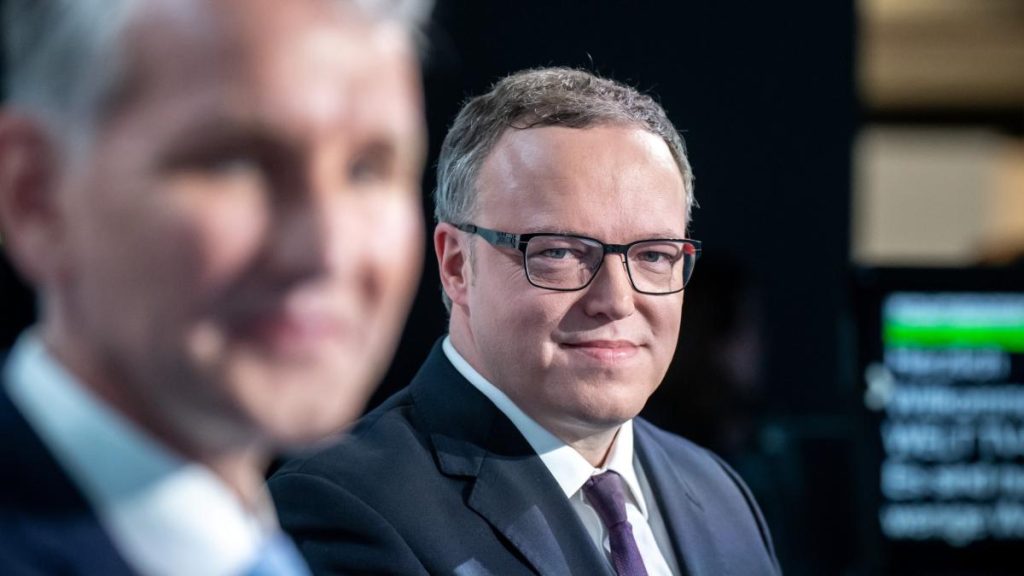The highly anticipated debate between Thuringian CDU leader Mario Voigt and AfD leader Björn Höcke on WELT TV focused on the future of Europe and the EU. Topics included antisemitism, remembrance culture, migration, and attitudes towards Russia, as well as lighter topics such as Mettbrötchen. Voigt, representing the CDU, maintained a composed yet aggressive stance throughout the debate, while Höcke, representing the AfD, appeared more aggressive and made several errors. Voigt’s strategy was to challenge and refute the AfD’s arguments, while the other parties continue to ignore the far-right extremists.
In the lead-up to the debate, the Thuringian SPD urged viewers to watch Netflix instead of the debate, reflecting a larger trend of ignoring the AfD. However, the AfD continues to gain popularity in polls, with around one-third of respondents in eastern German states considering voting for the party. Voigt, facing a tough electoral challenge, must attack and make up ground to become Minister President. Balancing the need to attack with maintaining a statesmanlike demeanor presents a difficult situation for Voigt, the only Thuringian among the leading contenders in the election.
During the debate, Voigt challenged Höcke on his controversial statements, labeling him as authoritarian and völkisch rather than bürgerlich. Höcke, in response, offered a last-minute olive branch to the CDU, suggesting a possible collaboration for a “civil-conservative-patriotic” shift in Thuringia. The debate, which was expected to last 45 minutes, ended up lasting nearly 75 minutes, with both candidates making their final statements on their respective visions for the region. Höcke’s willingness to cooperate with the CDU, despite their past animosity, highlights the complex political landscape in Thuringia ahead of the upcoming election.
Voigt’s continued emphasis on challenging the AfD’s arguments and presenting a democratic alternative to their authoritarian views reflects the larger trend within the CDU to engage in direct confrontation with the far-right party. Höcke’s performance, while at times strong, was marred by errors and controversies, such as his use of the SA slogan “Alles für Deutschland” and his comments on Turkish-German politician Aydan Özoğuz. The dynamics of the debate underscore the ideological differences and the challenges of coalition-building in Thuringia.
The debate also touched on issues such as the EU, with Voigt emphasizing the importance of European unity and peace, while Höcke advocated for the demise of the EU. The clash between the two candidates reflects broader divisions within German politics regarding European integration and cooperation. As the campaign intensifies leading up to the election in September, the debate serves as a critical moment in shaping public opinion and highlighting the contrasting visions for the future of Thuringia.
In conclusion, the debate between Voigt and Höcke highlighted the deep ideological divisions within Thuringia and Germany as a whole. While Voigt focused on challenging the AfD’s arguments and presenting a more democratic alternative, Höcke remained steadfast in his far-right views. The offer of cooperation from Höcke at the end of the debate adds a new layer of complexity to the political landscape in Thuringia, as parties navigate the challenges of coalition-building and addressing the rise of the far-right in German politics.


